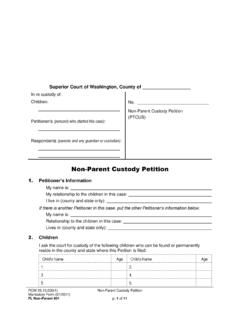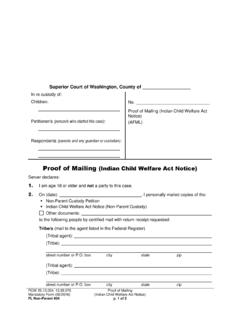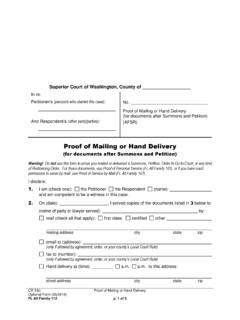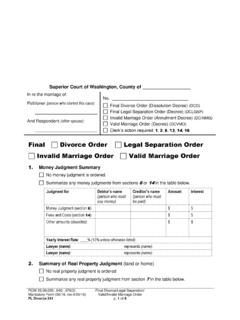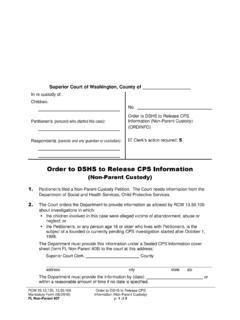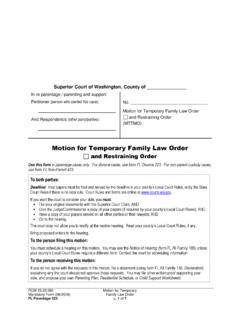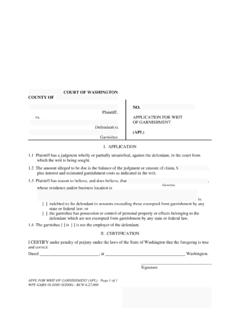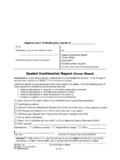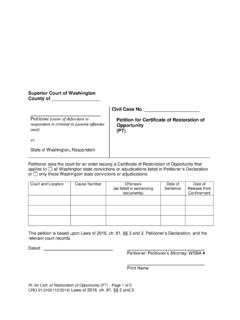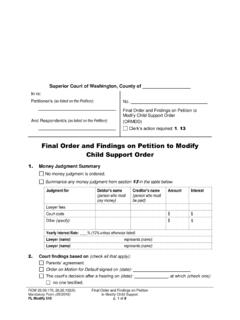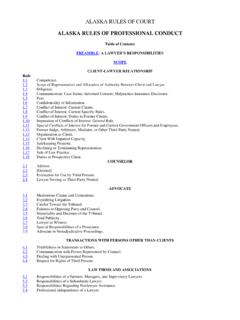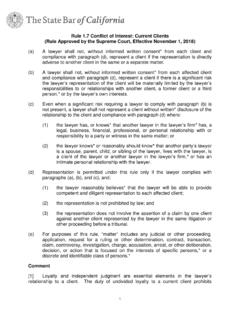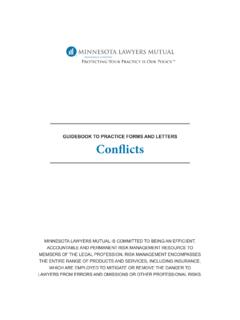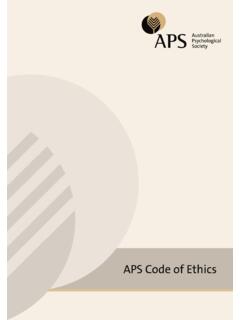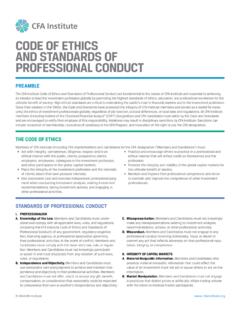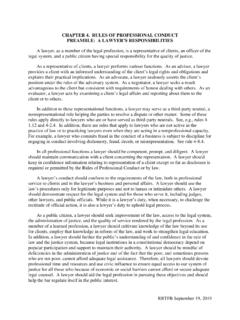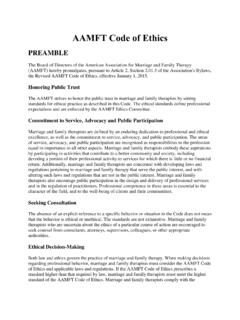Transcription of RPC 1.8 CONFLICT OF INTEREST: CURRENT CLIENTS ... - Wa
1 RPC CONFLICT OF interest : CURRENT CLIENTS : specific rules (a) A lawyer shall not enter into a business transaction with a client or knowingly acquire an ownership, possessory, security or other pecuniary interest adverse to a client unless: (1) the transaction and terms on which the lawyer acquires the interest are fair and reasonable to the client and are fully disclosed and transmitted in writing in a manner that can be reasonably understood by the client; (2) the client is advised in writing of the desirability of seeking and is given a reasonable opportunity to seek the advice of an independent lawyer on the transaction; and (3) the client gives informed consent, in a writing signed by the client, to the essential terms of the transaction and the lawyer s role in the transaction, including whether the lawyer is representing the client in the transaction.
2 (b) A lawyer shall not use information relating to representation of a client to the disadvantage of the client unless the client gives informed consent, expect as permitted or required by these rules . (c) A lawyer shall not solicit any substantial gift from a client, including a testamentary gift, or prepare on behalf of a client an instrument giving the lawyer or a person related to the lawyer any substantial gift unless the lawyer or other recipient of the gift is related to the client. For purposes of this paragraph, related persons include spouse, child, grandchild, parent, grandparent or other relative or individual with who the lawyer or the client maintains a close, familial relationship.
3 (d) Prior to the conclusion of representation of a client, a lawyer shall not make or negotiate an agreement giving the lawyer literary or media rights to a portrayal or account based in substantial part on information relating to the representation. (e) A lawyer shall not, while representing a client in connection with contemplated or pending litigation, advance or guarantee financial assistance to a client, except that: (1) a lawyer may advance or guarantee the expenses of litigation, including court costs, expenses of investigation, expenses of medical examination, and costs of obtaining and presenting evidence, provided the client remains ultimately liable for such expenses; and (2) in matters maintained as class actions only, repayment of expenses of litigation may be contingent on the outcome of the matter.
4 (f) A lawyer shall not accept compensation for representing a client from one other than the client unless: (1) the client gives informed consent; (2) there is no interference with the lawyer's independence of professional judgment or with the client-lawyer relationship; and (3) information relating to representation of a client is protected as required by Rule (g) A lawyer who represents two or more CLIENTS shall not participate in making an aggregate settlement of the claims of or against the CLIENTS , or in a criminal case an aggregated agreement as to guilty or nolo contendere pleas, unless each client gives informed consent, confirmed in writing.
5 The lawyer s disclosure shall include the existence and nature of all the claims or pleas involved and the participation of each person in the settlement. (h) A lawyer shall not: (1) make an agreement prospectively limiting the lawyer's liability to a client for malpractice unless permitted by law and the client is independently represented by a lawyer in making the agreement; or (2) settle a claim or potential claim for such liability with an unrepresented client or former client unless that person is advised in writing of the desirability of seeking and is given a reasonable opportunity to seek the advice of an independent lawyer in connection therewith.
6 (i) A lawyer shall not acquire a proprietary interest in the cause of action or subject matter of litigation the lawyer is conducting for a client, except that the lawyer may: (1) acquire a lien authorized by law to secure the lawyer's fee or expenses; and (2) contract with a client for a reasonable contingent fee in a civil case. (j) A lawyer shall not: (1) have sexual relations with a CURRENT client of the lawyer unless a consensual sexual relationship existed between them at the time the client-lawyer relationship commenced; or (2) have sexual relations with a representative of a CURRENT client if the sexual relations would, or would likely, damage or prejudice the client in the representation.
7 (3) For purposes of Rule (j), lawyer means any lawyer who assists in the representation of the client, but does not include other firm members who provide no such assistance. (k) While lawyers are associated in a firm with other lawyers or LLLTs, a prohibition in the foregoing paragraphs (a) through (i) of this Rule or LLLT RPC that applies to anyone of them shall apply to all of them, except that the prohibitions in paragraphs (a), (h), and (i) of LLLT RPC shall apply to firm lawyers only if the conduct is also prohibited by this rule. (l) A lawyer who is related to another lawyer or LLLT as parent, child, sibling, or spouse, or who has any other close familial or intimate relationship with another lawyer or LLLT, shall not represent a client in a matter directly adverse to a person who the lawyer knows is represented by the related lawyer or LLLT unless: (1) the client gives informed consent to the representation.
8 And (2) the representation is not otherwise prohibited by Rule (m) A lawyer shall not: (1) make or participate in making an agreement with a governmental entity for the delivery of indigent defense services if the terms of the agreement obligate the contracting lawyer or law firm: (i) to bear the cost of providing CONFLICT counsel; or (ii) to bear the cost of providing investigation or expert services, unless a fair and reasonable amount for such costs is specifically designated in the agreement in a manner that does not adversely affect the income or compensation allocated to the lawyer, law firm, or law firm personnel; or (2) knowingly accept compensation for the delivery of indigent defense services from a lawyer who has entered into a CURRENT agreement in violation of paragraph (m)(1).
9 [Adopted effective September 1, 1985; Amended effective September 1, 1993; June 27, 2000; September 1, 2006; April 24, 2007; September 1, 2008; September 1, 2011; April 14, 2015.] Comment Business Transactions Between Client and Lawyer [1] A lawyer s legal skill and training, together with the relationship of trust and confidence between lawyer and client, create the possibility of overreaching when the lawyer participates in a business, property or financial transaction with a client, for example, a loan or sales transaction or a lawyer investment on behalf of a client. The requirements of paragraph (a) must be met even when the transaction is not closely related to the subject matter of the representation, as when a lawyer drafting a will for a client learns that the client needs money for unrelated expenses and offers to make a loan to the client.
10 The Rule applies to lawyers engaged in the sale of goods or services related to the practice of law, for example, the sale of title insurance or investment services to existing CLIENTS of the lawyer s legal practice. See Rule It also applies to lawyers purchasing property from estates they represent. It does not apply to ordinary fee arrangements between client and lawyer, which are governed by Rule , although its requirements must be met when the lawyer accepts an interest in the client s business or other nonmonetary property as payment of all or part of a fee. In addition, the Rule does not apply to standard commercial transactions between the lawyer and the client for products or services that the client generally markets to others, for example, banking or brokerage services, medical services, products manufactured or distributed by the client, and utilities services.
